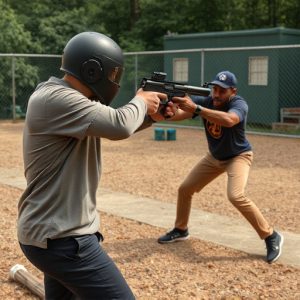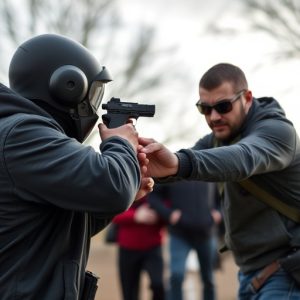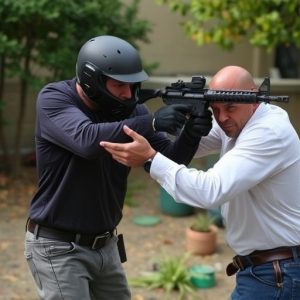Non-Lethal Weapon Training Certification: Safety, Legalities, and Real-World Applications
Stun guns, while marketed as non-lethal, pose significant risks to heart patients due to their elect…….
Stun guns, while marketed as non-lethal, pose significant risks to heart patients due to their electrical current. Comprehensive training, including de-escalation and legal implications, is crucial to minimize harm. Certification programs must educate users about these risks, especially in regions with varying stun gun regulations. Proper handling and informed decision-making are key to ensuring public safety, particularly for vulnerable populations with pre-existing heart conditions.
“In today’s diverse security landscape, non-lethal weapon training has emerged as a crucial aspect of law enforcement and personal safety. This comprehensive guide explores the ins and outs of non-lethal weapon certification, delving into essential topics like stun gun risks for heart patients and safety protocols.
Understanding these tools is vital to ensure their responsible use, especially in high-stress situations. From legal considerations to real-world applications, this article equips readers with knowledge to navigate the growing world of non-lethal weaponry.”
- Understanding Non-Lethal Weapon Training: A Comprehensive Overview
- Stun Guns and Heart Health: Exploring the Risks for Patients
- Certification Process: Gaining Expertise in Non-Lethal Weapons
- Safety Protocols: Ensuring Responsible Use in Law Enforcement and Security
- Legal Considerations: Navigating Regulations Around Non-Lethal Weaponry
- Real-World Applications: Enhancing Personal Safety and Public Security
Understanding Non-Lethal Weapon Training: A Comprehensive Overview

Non-lethal weapon training, often focusing on stun guns and similar devices, involves learning how to deploy and manage tools designed to incapacitate rather than cause permanent harm. This type of training is crucial for law enforcement, security personnel, and even civilians seeking self-defense options. However, it’s essential to understand that while these weapons are marketed as safe, they do come with specific risks and considerations, particularly for individuals with certain health conditions like heart problems. Stun gun risks for heart patients are a serious concern; such devices can cause severe complications in people with pre-existing cardiac issues due to the intense electrical charges they emit.
Comprehensive training should include detailed discussions on these risks, ensuring that users understand when and how to safely employ non-lethal weapons. Proper certification programs will educate individuals about safety protocols, de-escalation techniques, and the legal implications of using such devices. This knowledge is vital not only for effective self-defense but also for minimizing potential harm to oneself and others.
Stun Guns and Heart Health: Exploring the Risks for Patients
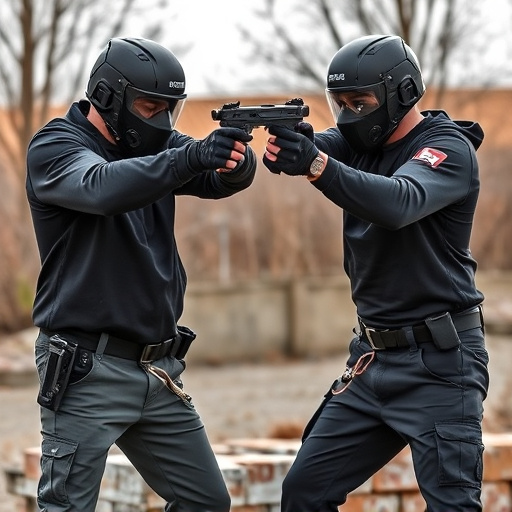
Stun guns, while marketed as non-lethal weapons, pose unique risks to individuals with pre-existing heart conditions. The intense electrical current discharged by stun guns can lead to serious adverse effects in heart patients, potentially causing arrhythmias or even cardiac arrest. Studies have shown that individuals with cardiovascular diseases are more susceptible to these risks due to the already compromised state of their hearts.
For individuals seeking non-lethal weapon training certification, understanding these stun gun risks for heart health is paramount. It’s crucial to consult a healthcare professional before operating such devices, especially if there’s any history of cardiac issues. This step ensures both personal safety and that of others, emphasizing responsible use and awareness of the potential dangers associated with stun guns among vulnerable populations.
Certification Process: Gaining Expertise in Non-Lethal Weapons
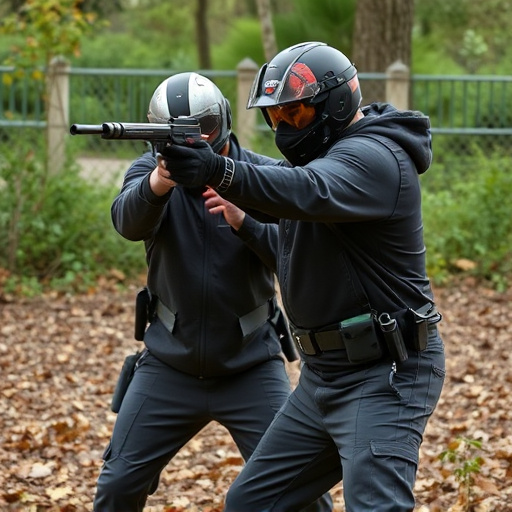
Obtaining a non-lethal weapon training certification involves a comprehensive process designed to equip individuals with the necessary skills and knowledge to handle these tools responsibly. The journey begins with thorough research, understanding local regulations, and identifying reputable training institutions. Aspiring professionals must demonstrate proficiency in various aspects, including weapon handling, de-escalation techniques, and legal considerations specific to non-lethal force applications.
One critical aspect that often surfaces during certification is the awareness of stun gun risks for heart patients. Given the potential electrical impact, individuals with cardiac conditions require extra caution. Comprehensive training programs educate candidates on these risks, ensuring they can make informed decisions in emergency situations while adhering to ethical guidelines and legal boundaries.
Safety Protocols: Ensuring Responsible Use in Law Enforcement and Security

In law enforcement and security operations, safety protocols are paramount when introducing non-lethal weapon training and certifications. Among the considerations, understanding the risks associated with stun guns is crucial, especially for officers interacting with individuals who have pre-existing medical conditions like heart problems. Stun gun use can potentially exacerbate these issues due to the electrical current’s impact on the body. Thus, comprehensive training must include scenarios that educate officers on managing such situations, ensuring they make informed decisions while maintaining safety.
This includes recognizing when a stun gun might not be suitable for a particular individual and having alternative tactics ready. Officers should be equipped with knowledge about heart patient risks to avoid accidental harm. Such protocols promote responsible use, fostering public trust and ensuring the well-being of both officers and individuals they serve or protect.
Legal Considerations: Navigating Regulations Around Non-Lethal Weaponry
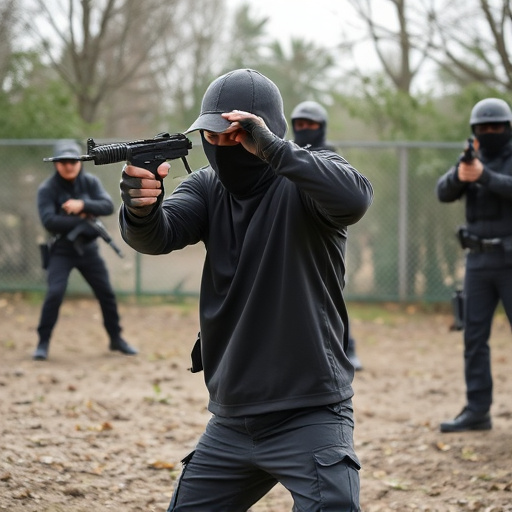
When considering non-lethal weapon training and certification, it’s crucial to navigate the legal landscape surrounding these devices. Regulations vary widely depending on location, with some areas having strict controls on who can carry and use stun guns or other non-lethal weaponry. One significant consideration is the potential risk to individuals with certain medical conditions, such as heart patients. Stun guns have been known to cause complications for people with cardiovascular issues due to the intense electrical current they emit. This raises important legal questions about consent, use of force, and liability in case of adverse effects.
Training programs should thoroughly educate students on these legal nuances, ensuring they understand not only the operational aspects of non-lethal weapons but also their responsibilities under local, state, or federal laws. Certification should include comprehensive risk assessments, particularly for individuals with pre-existing health conditions. This dual focus—on skill development and legal understanding—is essential to responsible non-lethal weapon training and usage.
Real-World Applications: Enhancing Personal Safety and Public Security
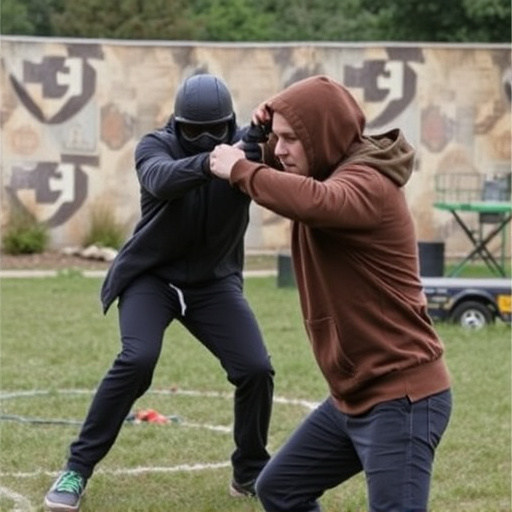
Non-lethal weapon training certifications equip individuals with tools to enhance personal safety and contribute to public security in various real-world scenarios. One such tool, the stun gun, has gained popularity due to its non-deadly nature, allowing users to disable aggressors temporarily. However, it’s crucial to note that individuals with heart conditions or certain medical vulnerabilities face heightened risks when employing stun guns. The electric charge administered by these devices can potentially trigger cardiac episodes in susceptible patients, making proper training and awareness essential for both personal well-being and public safety.
This certification process ensures that users understand the limitations and potential side effects of non-lethal weapons, especially among at-risk demographics. By learning to identify and mitigate such risks, individuals with certifications can effectively defend themselves while minimizing harm, contributing to a safer environment for all.
In conclusion, non-lethal weapon training certification equips individuals with valuable skills for enhancing personal safety and public security. By understanding devices like stun guns and their potential risks, such as those on heart health, law enforcement officers and security personnel can ensure responsible use. The comprehensive certification process, coupled with strict safety protocols and legal considerations, underscores the importance of these training programs in today’s world.
